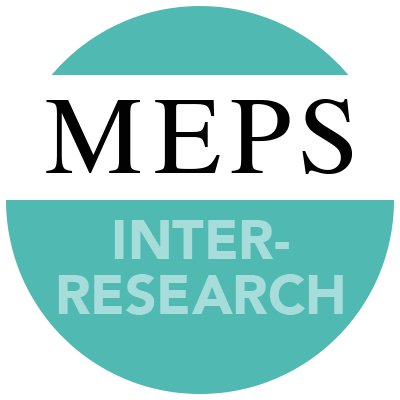
Marine Ecology Progress Series (MEPS)
@MEPS_IR
Followers
4K
Following
2K
Media
1K
Statuses
2K
MEPS has been long established as the leading journal in marine ecology. It is known for its high-quality publication of cutting edge research articles.
Oldendorf (Luhe), Germany
Joined June 2016
We overcome the challenge of estimating the distribution of crabeater seals in the Southern Ocean by combining seal presence data from multiple sources with environmental data from an ecologically-validated high-resolution ocean model. https://t.co/LD1Eavp4by
0
0
2
Arctic cod benthic-pelagic energy coupling may be linked to ontogenetic shift in gill raker density. https://t.co/P0pR1F6gs5
0
0
2
How do species survive harsh conditions? New study on mangrove crab Parasesarma persicum shows divergence between the Persian Gulf & Gulf of Oman due to low connectivity & extreme stress 🦀🌊 #MarineBiology #Crab #Evolution #PersianGulf
https://t.co/1sDwqoRKYB
@abankarimi
0
0
1
How are terrestrial arthropod assemblages in tidal marshes shaped? Environmental filters and species traits drive metacommunity patterns in SW-Atlantic marshes. Connectivity matters—preserving habitat links is key for coastal biodiversity. https://t.co/20k2O1Al3m
@IIMyCAr
0
0
0
Pinna rugosa has high ecological and economic value so careful management is critical. Despite its importance, research on this species remains scarce. To enhance understanding, we analyzed its biochemical composition across various tissues. https://t.co/TDSQt1Lcfl
1
0
2
Arctic seals face many climate challenges, including northward expansion of "boreal" species. The temperate habour seal now overlaps with endemic seals in Svalbard; spatial segregation between species appears to limit competition, thus far. https://t.co/546X36zuhF
0
2
5
We now know that thick-billed murres from Cape Parry, the only western Canadian colony, migrate to the Bering Sea foraging mainly on fish. Males & females molt in different areas & might be exposed to different threats more so during the fall than winter. https://t.co/oJIdb2ettU
0
1
3
Otolith data reveal a marked erosion of Chinook salmon age structure over four millennia, shifting from older, diverse returners to younger, less diverse cohorts. This long-term loss of life-history diversity threatens resilience and ecosystem stability. https://t.co/QCaK3mbJ01
0
0
1
Silky sharks in the Red Sea exhibit previously undescribed responses to elevated sea surface temperatures, spending warm seasons in a narrow band of cool, deep water. https://t.co/JOnLembxOe
0
2
3
Acoustically tagged reef manta rays at Palmyra Atoll had an average residency rate of 88% and showed consistent use of all four primary habitats at Palmyra with the highest rates of detection recorded in the nutrient rich lagoon habitats. https://t.co/12fVs1VHtv
0
4
5
We tested AMBI and M-AMBI on live and fossil benthic communities from Onslow Bay, NC. Fossil-based M-AMBI outperformed AMBI and is best for spatial comparisons, aiding reconstructions of past ecosystem health. https://t.co/0tipzsmehm
0
1
3
In summer 2023, a shipboard imaging dataset captured an unusually high number of bivalve larvae in surface waters of the Chukchi Sea. This large multi-species spawning event provides new insight into Arctic bivalve reproductive behavior. https://t.co/o8EKBQsAWG
0
0
3
Rubble increases on reefs as disturbances do. We investigate how long it takes for loose rubble to bind together into a stable reef. We report the flow thresholds needed to break apart bound rubble. Our work can help estimate reef recovery times. https://t.co/tZb6HqHUeg
0
1
0
When heatwaves coincide with cool seawater, juvenile Pisaster ochraceus show reduced feeding, metabolism, and survival; yet warmer seawater can buffer these effects. Timing of heatwaves may alter keystone predation and intertidal communities. https://t.co/zQzf8cd9Fg
0
3
0
Larval dispersal is an inherently variable process. By adapting risk-management techniques from finance, this paper demonstrates that accounting for this variability can result in improved outcomes for ecosystem services and conservation. https://t.co/hB8GLiGY6r
0
2
1
This study examines macrobenthic communities in eight deep sub-Arctic fjord basins of northern Norway, using taxonomic and biological trait data to characterize basin-specific ecological patterns and assess processes underlying community assembly. https://t.co/sAQZTarkzC
0
2
2
Sea-level rise drives demand for marine sand in coastal protection—but at what cost to benthic life? Based on 34 years of data, our SDMs reveal key insights for sustainable marine management. Check out the study for more details. https://t.co/BZ5DUw9dGF
0
2
2
Lonati et al. found groups of endangered North Atlantic #rightwhales feeding in diverse oceanographic conditions in the Gulf of St. Lawrence, Canada. Time of day, month & depth were some variables that influenced what was on the menu! https://t.co/FHUNPidFC4
0
1
2
Fish in the Curonian Lagoon (Baltic Sea) are maturing at smaller sizes as waters warm. Long-term data (1949–2023) show rapid, species-specific shifts in growth, supporting the temperature-size rule. #ClimateChange #Fisheries #TSR #BalticSea #CuronianLagoon
https://t.co/6o0s5vo44h
0
0
1
Rare jelly-falls from appendicularians observed in an Arctic fjord! A hidden link between gelatinous plankton and the carbon cycle? https://t.co/EZXQQo5I25
0
0
0
